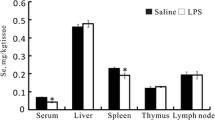Abstract
Selenium (Se) is an essential as well as a toxic trace element in animal and human nutrition. The immune system is a known target of Se intoxication. The objectives of the present study were to determine the effects of oral exposure to inorganic and organic forms of Se on the murine immune system and to compare the relative toxicity of the different chemical forms. Male BALB/c mice, 6–7 weeks of age, were exposed continuously to 0, 1, 3 or 9 ppm of Se as sodium selenite or seleno-L-methionine in the drinking water for 14 days. Following the treatment period mice were euthanized; trunk blood, spleen, thymus, liver and kidney were aseptically collected and organs weighed. Single-cell splenocyte cultures were made from the spleens and used to determine the effects of Se treatment on mitogen-induced lymphocyte blastogenesis and cytokine production. There were no changes in the 0 and 1 ppm Se groups as selenite. The thymus/body weight ratio was significantly reduced at 3 ppm Se as sodium selenite, and all other parameters remained unaffected. Exposure to 9 ppm of Se as sodium selenite resulted in marked decrease in body weight gain and relative organ weights. Treatment of mice with 9 ppm Se as sodium selenite increased erythrocyte counts in peripheral blood, reduced splenic cellularity, but increased the basal rate of splenocyte proliferation and induced a dose-dependent increase in phytohemagglutinin-P-induced lymphocyte proliferation. Sodium selenite at this dose increased the production of proinflammatory cytokines, tumor necrosis factor α and interleukin-1β, in lipopolysaccharide-stimulated splenic macrophages. Mice exposed to Se as seleno-L-methionine in the drinking water did not display any effects on the parameters examined at the dose range in this study. Results indicated that splenic macrophages and lymphocytes are sensitive to Se intoxication and there is a disparity in the immune system toxicity of inorganic and organic forms of Se administered via the drinking water, inorganic Se being more toxic.
Similar content being viewed by others
Author information
Authors and Affiliations
Additional information
Received: 7 October 1999/Accepted: 28 February 2000
Rights and permissions
About this article
Cite this article
Johnson, V., Tsunoda, M. & Sharma, R. Increased Production of Proinflammatory Cytokines by Murine Macrophages Following Oral Exposure to Sodium Selenite But Not to Seleno-L-Methionine. Arch. Environ. Contam. Toxicol. 39, 243–250 (2000). https://doi.org/10.1007/s002440010101
Issue Date:
DOI: https://doi.org/10.1007/s002440010101




